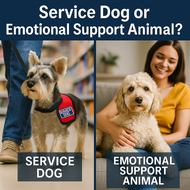Service Dog or Emotional Support Animal? Key Differences
Posted by WorkingServiceDog on Jul 1st 2024
Service Dog or Emotional Support Animal?
Dogs have worked alongside people for centuries. Today, service dogs and emotional support animals (ESAs) both provide important help—but they are not the same. They differ in training, the tasks they perform, and the legal rights they have.
What Does a Service Dog Do?
Under the Americans with Disabilities Act (ADA), a service dog is individually trained to perform specific tasks directly related to a person’s disability. Examples include:
- Guide Dogs — Help people who are blind or have low vision navigate safely.
- Hearing Dogs — Alert to sounds such as alarms, doorbells, or a ringing phone.
- Mobility/Task Dogs — Open doors, retrieve items, carry essentials, or assist with balance.
- Medical Alert/Response Dogs — Alert to seizures or dangerous blood-sugar changes and help keep the handler safe during events.
What Rights Do Service Dogs Have?
The ADA grants service dog teams public access in places where pets are not allowed (restaurants, stores, hotels, and other public accommodations). Housing providers must allow service dogs, even with “no-pet” rules. For air travel, U.S. Department of Transportation rules allow service dogs to fly with their handler; airlines may require the DOT Service Animal Air Transportation Form—check your carrier’s current policy before you fly.
What Does an Emotional Support Animal Do?
ESAs provide comfort that helps alleviate symptoms of a mental health condition (such as anxiety, depression, or PTSD). ESAs are not required to have specialized task training like service dogs. To qualify, a person typically needs a letter from a licensed healthcare professional stating that the animal provides therapeutic benefit.
What Rights Do Emotional Support Animals Have?
ESAs have housing protections under the Fair Housing Act (FHA)—landlords must consider reasonable accommodation even in no-pet housing. ESAs do not have public access rights under the ADA, and since 2021 U.S. airlines generally treat ESAs as pets (standard pet fees and policies apply).
A Note on Honesty
It’s fraudulent to represent a pet as a service animal. Clear, truthful identification—and excellent behavior from the dog—helps protect access for legitimate teams.
Need gear that keeps things clear and professional? Explore our Service Dog Kits and ESA kits (optional for ADA, helpful for clarity).


